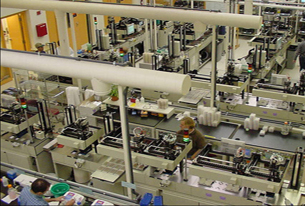|
The Genetic Underpinnings of Cancer
In a massive sequencing effort, researchers have, as they put it, defined the genetic landscape of two of the most common types of cancer, revealing nearly 200 genes involved in breast and colorectal cancer. Most weren't previously known to play a role in cancer, and now provide a wealth of new targets for developing diagnostic tests and therapies. The study illustrates the potential of a large new effort to find the genetic causes of cancer.
 |
|
| Large-scale sequencing center. Image provided by The Cancer Genome Atlas. |
|
Breast cancer is the most common type of cancer among women. Colorectal cancers — cancers of the colon or rectum — are the fourth most common type of cancer in both men and women. A large team of researchers at the Johns Hopkins Kimmel Cancer Center, a designated Cancer Center of NIH's National Cancer Institute (NCI), and several other institutions collaborated to sequence and analyze 13,023 genes in 11 breast and 11 colorectal cancers. They reported their results in the September 7 online issue of Science.
Their analysis showed that individual tumors have an average of about 90 mutant (altered) genes but that only a subset of these contribute to cancer. They identified 189 genes, an average of 11 per tumor, that were frequently mutated. The vast majority were not previously known to be altered in tumors. Based on the genes' sequences, they're predicted to affect a wide range of functions in the cell.
"The findings at Johns Hopkins are just the beginning," said Dr. Francis S. Collins, director of NIH's National Human Genome Research Institute (NHGRI). The Cancer Genome Atlas (TCGA), which was launched in December 2005 as a three-year, $100 million pilot project by NIH's NCI and NHGRI, aims to use large-scale genome sequencing and other genomic technologies to comprehensively identify the genetic changes that cause cancer.
"We anticipate that as TCGA scales up," Collins said, "we may be able to identify the majority of genetic changes that cause the most important and common forms of the major cancers. In fact, the large number of mutations reported in this paper offers a glimpse of what is yet to come and provides exciting new directions for drug discovery in breast and colon cancer."
NCI Deputy Director Dr. Anna D. Barker said that this study is very promising, both for TCGA and for future drug discovery efforts. "Maximizing the numbers of targets available for drug development in a specific cancer," she said, "means that patients will ultimately receive more personalized, less toxic therapies."
|


